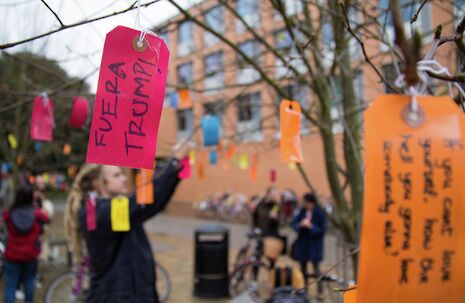Cantabs march against Trump
A Stand Up to Racism rally will take place in Cambridge as the CUSU Women’s Campaign march in London

Protesters are set to rally in cities across the world as Donald Trump is sworn in as 45th President of the United States of America.
Cambridge is among over 20 UK cities where protest marches have been spurred on by Trump’s inauguration. The marches are a response to the President-elect’s history of xenophobic and misogynistic remarks, which many fear will translate into policy once he takes office.
A rally to celebrate a diverse and multicultural Cambridge and stand up against racism will be held by Cambridge’s branch of the campaign group Stand Up to Racism in Market Square on Saturday at midday.
When asked about their reasons for protesting Trump’s inauguration, their co-ordinator Richard Rose told Varsity of his concerns about the negligence that anti-racists had shown recently, and spoke of the necessity of speaking out against Trump.
“One of the reasons racism in Cambridge may be lower than in surrounding areas is because anti-racists have been constantly vigilant, not letting any example of racism go unchallenged,” Rose explained. “That's why we need to make a fuss about Trump here and in London. Anti-racists have been on the back foot for a few months now – it's time for us to go back on the offensive: we are the vast majority!”
The Cambridge rally will be attended by the MP for Cambridge, Daniel Zeichner.
In a press release, Zeichner said: “As Donald Trump is sworn in as President of the United States on the back of a campaign which fractured the country and too often descended into the politics of hate, I am proud to join this campaign in saying that Cambridge welcomes multiculturalism and diversity.
“Sadly, following the EU referendum, we have seen a rise in hate crime in Britain and it is important that Cambridge stands together as one, united behind the common values that make our city so great; tolerance, diversity and internationalism. We should be building bridges not walls.”
More than fifty Democrats, including civil rights campaigner John Lewis, will be boycotting the inauguration at the White House. Meanwhile, here in the UK, more than 50 public figures, including shadow cabinet members Diane Abbott and Clive Lewis, have signed a statement encouraging Trump’s “growing opposition” to protest against him.
“The politics of fear and division have no place in 2017”
Perhaps the most prolific strain of the marches taking place this Saturday are the Women’s Marches. Hundreds of these have sparked up in cities across the world, including the Women’s March on London.
Organisers of the London strand are adamant that “the politics of fear and division have no place in 2017”, and have gathered support from such groups as Amnesty International, the Women's Equality Party and Greenpeace.
The CUSU Women's Campaign will be sending a contingent to join the Women’s March on London.
“Engaging in protests like these can be cathartic as well as effective,” Audrey Sebatindira, CUSU Women's Officer told Varsity. “Marching in solidarity with others who are equally as angry as you about the state of the world - refusing to let that anger be silenced - is an important part of liberation and sends a message to others that we won't allow our interests to be threatened without a fight.”
The first of these marches to be set up, the Women’s March on Washington, has more than 200,000 people planning to attend according to Facebook. The march organisers had clearly intended others to follow their lead, calling for a global response: “individuals and organisations committed to equality, diversity, and inclusion” have been encouraged to join them “in representing the rights and voices of progressive people around the world.”
Although the marches will unite individuals against Trump across the world, there has been some division amongst the marchers. The March on Washington released a “statement of inclusivity” in which they acknowledged that some women did not feel “adequately represented” by their march. They said to these individuals, “we want to state to you clearly: we see you, we hear you, and we understand.”
Indeed, marches divided according to issues of race and gender could be seen to reflect underlying tensions among Trump’s opposition. However Sebatindira, CUSU Women’s Officer, was clear that the Women’s Marches encompassed many different issues: “we’re certainly hoping that issues concerning racism and other forms of marginalisation won't be ignored by the marchers and organisers.”
Similarly, The Women’s March on Washington has been eager to reiterate the overriding purpose of the marches. “The work of this march is not only to stand together in sisterhood and solidarity for the protection of our rights, our safety, our families and our environment,” they announced, “but it is also to build relationships and mend the divides between our communities.”
In November 2016 Cambridge students hung dozens of brightly coloured tags, carrying messages of hope and solidarity, outside the Alison Richard Building at the Sidgwick Site in a stand against hate and xenophobia.
 News / Night Climbers call for Cambridge to cut ties with Israel in new stunt15 April 2024
News / Night Climbers call for Cambridge to cut ties with Israel in new stunt15 April 2024 News / Police to stop searching for stolen Fitzwilliam jade17 April 2024
News / Police to stop searching for stolen Fitzwilliam jade17 April 2024 News / Cambridge University cancer hospital opposed by environmental agency12 April 2024
News / Cambridge University cancer hospital opposed by environmental agency12 April 2024 Interviews / In conversation with Dorothy Byrne1 March 2024
Interviews / In conversation with Dorothy Byrne1 March 2024 Features / Cambridge’s first Foundation Year students: where are they now?7 April 2024
Features / Cambridge’s first Foundation Year students: where are they now?7 April 2024



